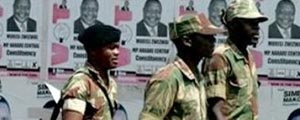
VILLAGERS in Mberengwa say they were now living in fear following the recent heavy deployment of soldiers to spearhead Zanu PF campaigns in the area.
Report by Nqobani Ndlovu
They say the soldiers were being moved out of Mataga Army Barracks and encamped at Mataga Irrigation Scheme where they were allegedly forcing villagers to attend Zanu PF campaign meetings.
Distraught villagers told NewsDay at the weekend that the latest deployment was carried out last Monday.
“They are holding Zanu PF meetings and forcing villagers to attend them. They are saying terror will visit us if Zanu PF loses,” said one of the villagers, Gadu Matavire.
MDC-T Midlands South provincial secretary for defence Trynos Shava confirmed the army deployments , saying they suspected the move was aimed at intimidating villagers ahead of harmonised elections to be held later this year.
“At first, villagers were made to understand that they (soldiers) are coming here for Operation Maguta to revive the irrigation scheme, but to our surprise they are now campaigning for Zanu PF,” Shava told NewsDay over the weekend.
“It is a strategy to campaign for Zanu PF and intimidate villagers.” Bulawayo-based political analyst Dumisani Nkomo, who is also the chief executive officer of Habbakuk Trust, described the reports as worrisome, given that the country was preparing for elections.
- Chamisa under fire over US$120K donation
- Mavhunga puts DeMbare into Chibuku quarterfinals
- Pension funds bet on Cabora Bassa oilfields
- Councils defy govt fire tender directive
Keep Reading
“This would appear to be part of the whole election campaign to try and scare villagers. Soldiers should reside in the barracks because their presence in the communities sends a message and perception that they are out there to violate people’s rights,” said Nkomo.
“As it is, Mberengwa villagers cannot be safe in the presence of these soldiers, especially if we are to think of the 2008 scenario where soldiers were leading violent campaigns in rural areas.”
Strenuous efforts to contact army spokesperson Major Alphios Makotore for comment were fruitless as he was unreachable on his mobile phone.







